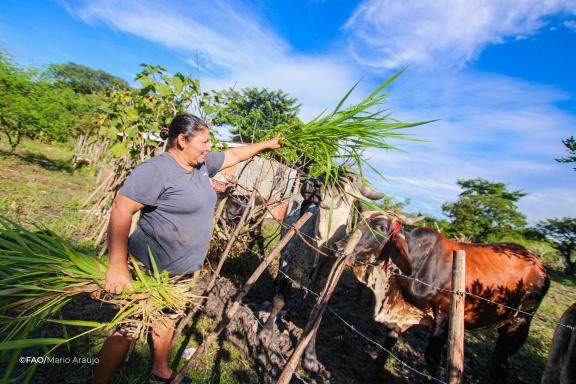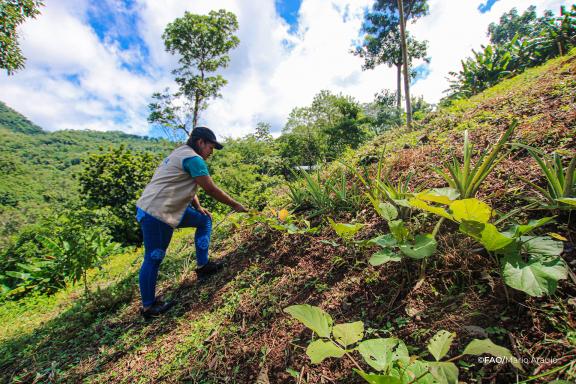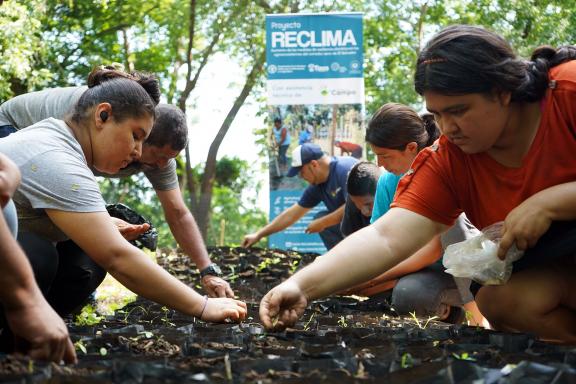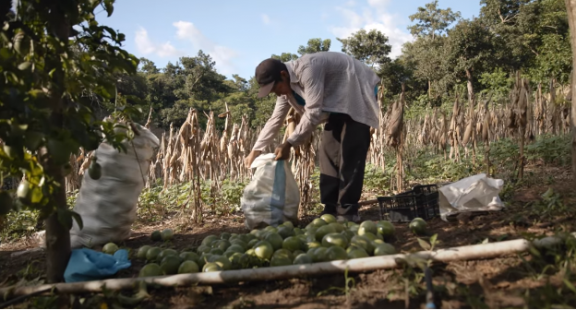The Dry Corridor is a vast expanse of tropical, dry forest that spans six countries in Central America. It is home to 11.5 million rural people who depend on agriculture for their livelihoods. Unfortunately, the region is highly vulnerable to climate change due to erratic rainfall patterns, deforestation, and land degradation.
Known for its erratic rainfall patterns, the Dry Corridor is one of the world’s most exposed and vulnerable regions to climate change. In El Salvador, freshwater availability is well below the critical threshold and rainfall variability, temperature, and occurrence of extreme weather is projected to only increase. For over a decade, warming temperatures and severe drought – coupled with deforestation and land degradation – have led to a water-thirsty agriculture sector and threatened the food security of its people.

El Salvador is one of the six countries that make up the Central American Dry Corridor, a vast expanse of land that is particularly exposed to climate change and water scarcity. Restoring degraded ecosystems here is key to regenerating the land and replenishing water sources critical to people’s daily lives. Photo: FAO/Mario Araujo
“This soil. This water. This is my home. When the ground became dry, I was afraid. We were all afraid. The soil lost its moisture, its nutrients, and its life.”
Due to the deforestation uphill, there’s no vegetation and roots to slow down and absorb the rainwater as it torrents down the lower hills. The floods can wreak devastating consequences on the environment and communities. That's why "Upscaling climate resilience measures in the Dry Corridor agroecosystems of El Salvador" (RECLIMA) project is so important. This USD 127.7 million initiative, funded by the Green Climate Fund (GCF) and implemented by the Food and Agriculture Organization (FAO), is focused on restoring degraded ecosystems and replenishing water sources that people depend on for their food, income, and well-being.
The RECLIMA project is supporting rural communities in El Salvador to become more resilient to climate change in three significant ways:
1. Reintroducing native trees to fight water stress
Rural communities are setting up tree nurseries to restore degraded ecosystems through reforestation and other techniques. Communities involved in the project receive young tree species native to Central America to plant on their lands. The soil is restored and retains water once again. Instead of floods, water from heavy rainfall is now stored in the upper hills, providing water to the lower lands.

The RECLIMA project improves the resilience of vulnerable smallholder farmers to climate change through the implementation of different adaptation practices and ecosystem restoration techniques. ©FAO/Javier Orellana
2. Enhancing farmers' resilience through agroforestry
Known as agroforestry systems, integrating trees with crops and livestock grazing improves water infiltration, restores soil moisture, and restores vital ecosystems and biodiversity. These combinations improve production, reduce erosion, and capture carbon. FAO and El Salvador's National Centre for Agricultural and Forestry Technology have engaged almost 46,070 farmers in novel, participatory activities at farmer field schools to increase agroforestry practices. The growing trees provide shade and vital biodiversity and ecosystems can be revived.

Ecosystem restoration and sustainable land management have enormous potential for climate action FAO/Fundacion Campo
3. Restoring plant cover for water security and climate action
Sustainable land management is a winning solution for people and the environment. Farmers in the region are implementing sustainable agricultural practices on more than 51,000 hectares of land, helping to restore ecological connectivity and increase the movement of species and the flow of natural processes.
With more plants and trees, more carbon dioxide (CO2) is removed from the atmosphere and stored in the soil; the soil is healthier, more fertile, and rich in nutrients; and water penetrates the ground, resulting in more abundant food production.
“People ask me why my passion fruits are so big. And I say it’s because of how I manage my crops. Now, we have the opportunity to harvest and eat”

Farmers are implementing sustainable agricultural practices on more than 20,000 hectares of land, helping to restore ecological connectivity, ensuring the increased movement of species and flow of natural processes. Ivan Azucena, Zacatecoluca, El Salvador. © FAO
The RECLIMA project alone has already reduced around 2.3 million tonnes of CO2 equivalent, and a further two million tonnes of emissions are estimated to be sequestered by the completion of the project.
It's clear that restoring degraded ecosystems in El Salvador and the Central American Dry Corridor is key to regenerating the land and replenishing water sources that people depend on for their food, income, and well-being. Family farmers are making a real difference by becoming more resilient to climate change through reforestation, agroforestry, and sustainable land management, merging new and old practices derived from ancient wisdom and tradition.
GCF is committed to financing and supporting the development of agroforestry systems to restore ecosystems and replenish vital water sources across the Central American Dry Corridor for generations to come.
By Jin Hee Dieu (Based on FAO’s story)